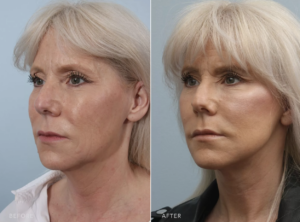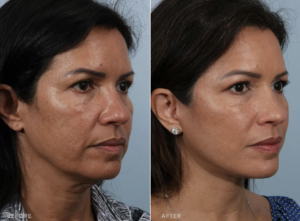After undergoing deep plane facelift surgery, following postoperative instructions will help ensure a smooth recovery. Recovering after a deep plane facelift surgery can take seven to 14 days, depending on the procedure.
Most patients do not complain of discomfort, but often describe it as being sore or a tight feeling.
It’s common to have low energy levels following surgery. It’s important to minimize all activities for several days, as unnecessary activity will encourage swelling, discomfort, and bleeding.
Resist using your recovery period to catch up on errands, exercise, or home projects — you need rest.
The Day After Deep Plane Facelift Surgery
After outpatient surgery, you may return home. You will need to arrange for someone to escort you home after your procedure and stay with you for at least 24 hours following the surgery.
Rest in bed, or in a reclining chair, with your head elevated for the first 48 to 72 hours after surgery.
Use cold compresses over your cheeks and neck every 20 to 30 minutes for up to seventy-two hours to minimize swelling.
Patients should have little to no postoperative pain after facelift surgery. If you experience significant sharp or dull pain that persists, notify your doctor’s office immediately.
What to Expect From Your Postoperative Appointments
Your first return appointment will be the day following surgery. During this appointment, your dressing will be removed and replaced, and your incisions will be cleaned.
At your second postoperative appointment on day three, your dressing will be removed, and the incision will be cleaned again. The nurses will show you how to properly care for your incisions during this appointment.
Six days following surgery, all or part of your sutures will be removed. Some patients are asked to return two days later (the 8th day after surgery) to have the rest of their sutures removed.
When to Resume Normal Activity
Keep your activity level to a minimum for three to five days after surgery. To keep your blood pressure down, you should avoid strenuous activities for three weeks to one month. This includes heavy lifting, bending, and participating in sports activities.
https://www.instagram.com/reel/CzMrVzGpsk9/?igsh=am9kaWg0dWt0Y2Vi
Most patients feel comfortable going out in public after a week or two. When you resume social activities and return to work depends on your comfort level.
The average patient returns to work or social activities in seven to fourteen days. At about three weeks, you can start with aerobic activities; however, avoid anything involving contact for three weeks.
After this period, most patients are healed and can get back to contact activities.
How to Manage Pain During Deep Plane Facelift Recovery
Facelift surgery usually involves little or no postoperative pain. If you experience significant sharp or dull pain that persists, notify your doctor’s office immediately.
Bruising is quite common, along with some asymmetrical swelling. This does not affect the outcome of surgery.
It is normal to feel slight itching and tightness in your face during the early healing period.
Two weeks after surgery, you may begin taking ibuprofen, such as Advil or Aleve (as directed). This can help decrease chances of incision lines becoming a little darker (hyperpigmentation). Take until all redness or inflammation is gone, but for no longer than three weeks.
If you are prescribed an antibiotic after your surgery, remember to take it with food.
After deep plane facelift surgery, the face typically feels tight. Accompanying soreness may be treated with analgesics. For the first few days after surgery, the incisions should be treated with ointment to keep them lubricated.
I often see some more bruising, especially of the face/lower eye area, if my patient has fat transfers. Camouflaging cosmetic products, such as concealer, can be used to help cover any remaining bruising. Just make sure you check with your surgeon to ensure that your products won’t cause an adverse reaction.
How to Care For Dressing/Incision Lines
Incision lines (scars) are a normal outcome of surgery, and are placed in areas that are concealed either within the hairline or within natural folds of the skin. Placement of incisions will be discussed in detail during the consultation process.
After the dressing is removed on the third day after surgery, gently clean the incision line with distilled water. Once a day, apply a thin layer of aquaphor as instructed by your nurse.
Be sure that you re-apply Aquaphor after showering, and pat your incision line dry with a soft hand towel.
Massage incision lines and apply small amounts of Aquaphor each morning and evening after deep plane facelift surgery.
Your nurse will show you how to clean your incision during the postoperative appointments.
The sun can make scars appear more prominent, so protecting them from the sun is essential. For the first couple of weeks following the surgery, dark sunglasses are recommended to protect the eyes from irritation caused by the sun and wind. Patients may notice that their eyes tire easily for the first few weeks of the recovery period.
Sleeping After Deep Plane Facelift Surgery
After facelift surgery, sleep on your back or side with your head elevated above your chest.
Continue sleeping elevated for approximately one week, and, if possible, on your back for a few weeks afterward.
What to Eat After Deep Plane Facelift
In most cases, a healthy appetite will return within twenty-four to forty-eight hours of anesthesia. Start eating when you feel hungry. Consider light liquids (broth, ginger ale, crackers, toast, etc.), and progress slowly to regular foods.
Avoid food and drinks that cause fluid retention, such as high fat, salty foods, and excessive amounts of alcohol. Don’t avoid drinking water, though! Proper fluid intake is important to your health and healing.
Increase fluids such as water and fruit juices, but stay away from citrus fruits. Avoid alcohol, nicotine, and caffeine, as these will dramatically slow the healing process.
Avoid salty foods both before and after surgery as they can cause increased swelling and pain.
Healing after Facelift Surgery
Healing after surgery takes time. Your scars will eventually fade and become nearly invisible. Until that happens, you can expect that the scars will be pinkish for six months or so.
View this post on Instagram
While lasting results are possible from these surgical procedures, they may be affected by your lifestyle and skin care.


